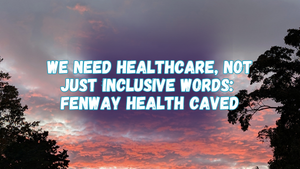Fenway Health, a nationally recognized LGBTQ+ health center in Massachusetts, announced that they stopped prescribing gender-affirming hormone therapy or puberty blockers for patients younger than 19 years old, as of October 1st.
WBUR reports the details:

I was shocked Fenway caved to government pressure to keep their federal funding and benefits. Because they are specifically an LGBTQ+ health center, it feels like they got their priorities very wrong. (Of course, I don't have any insight into their finances or why they might have made this concession.)
This is shocking, but it's also important to keep in mind relatively few teenagers actually have accessed puberty blockers or gender-affirming hormone therapy. NPR reports that out of a data set of 5 million adolescents with private insurance, fewer than 2,000 ever had access to gender-affirming hormones.
Amplify Respect is a newsletter to uplift and inform trans folks and allies.
If you find it helpful to learn how to talk about a trans family member, how to promote your work as an LGBTQ+ creator, or how to write about trans people respectfully, you should subscribe.
I'm familiar with Fenway Health both from their publicity as an LGBTQ+ affirming care provider and as a former patient. The health care providers who I saw briefly seemed like inclusive, kind-hearted experts. But their administration, processes, paperwork, software, and billing, were so challenging and lacking in resources that I decided to look for another clinic. It's important to me to be able to call my doctor's office and get through to a person most of the time.
Trans-friendly healthcare providers work at many hospitals and medical clinics in and near Boston. I've certainly heard many horror stories of providers who are cruel and uninformed, but some are good. Boston Medical Center (BMC) has a GenderCare Center, and they provide trans-inclusive care to adults and youths.
BMC is not a Federally Qualified Health Center, so I'm hopeful they do not experience as much pressure to conform to federal policies.

It's alarming that Fenway stopped offering this care. But I feel like people don't acknowledge how robust Massachusetts' health care system is.
MassHealth was signed into law by Republican Governor Mitt Romney in 2006, and was one of the models of the Affordable Care Act's health insurance exchanges. And at least for right now, MassHealth insurance plans cover gender affirming healthcare.
(If you're a trans person wondering what US state to move to, keep MassHealth in mind. Sure, rent is expensive, but so is medical care without coverage.)
Fenway has all the decorations of being an excellent LGBTQ+ health center. Their providers use inclusive language. They have welcoming and affirming signs in their office. They make trans people feel welcome there.
But if trans people can't access the medical care they need there, is the inclusive language what's important?
If Fenway Health was willing to make this presumably pragmatic decision to cut their services in return for keeping their government funding, what other lines are they willing to cross?

I have heard complaints about providers at other organizations that are dismissive of trans people's concerns, getting names and pronouns wrong, and just misinterpreting what people need because they don't understand the trans experience. That's also been my typical experience with providers myself.
I think many trans people would agree with me that being called by the right name and pronouns is a "nice to have" when compared to not getting the medication you need.
It can be incredibly important and even life-saving to have access to gender-affirming hormone therapy and other medications and procedures.
Patients can feel dysphoric and uncomfortable if healthcare providers misgender them. Misgendering also often is a symptom of the provider being generally uninformed about trans people.
If they're not willing to get this basic fact right about you, what chance do you have that they understand what's going on with your body and prescribe you appropriate and helpful treatment?
I remember going to a gynecologist several years ago who I wasn't out to. She referred to the exam as a "well woman" exam multiple times and also misgendered me.
The unnecessary gendered language the provider used made me uncomfortable, but what I particularly didn't appreciate was that she didn't listen to my health complaint. She noted down almost the opposite of what I had told her. She literally did not listen to what I was saying, so I was not able to get medical help.
This had nothing to do with me being trans.
But I think that health care providers who make lots of incorrect gendered assumptions about their patients are more likely to make assumptions in general about patients' medical care. They work from what they assume must be right instead of listening to the patient and finding out what's going on with them that day.
It's hard to find a health care provider who does everything right: who uses inclusive language, is knowledgeable on trans healthcare, and is supported by a large enough organization that it doesn't feel the need to cave to government pressure.
My opinion about Fenway Health's decision is that it's unfortunate, but, instead of campaigning to make them reverse their decision somehow, our energy would be better spent trying to educate and inform health care providers at other institutions.
Health coverage is likely to change for many people next year. For the next two months, we just have to keep doing what we've been doing: getting our prescription refills on time, and accessing preventative care like vaccines if possible.
Quality healthcare for trans people is not just access to hormones and surgery, but also respectful, expert preventative care such as cancer screenings. I wrote about how trans women are at risk for prostate cancer whether or not they've had bottom surgery, for example.

Let's take it one day at a time. One day more, you might say. Check out this amazing rendition of the Les Mis song in which Jinkx Monsoon plays ALL THE PARTS. Incredible voice control.
Amplify Respect is a newsletter to uplift and inform trans folks and allies.
If you find it helpful to learn how to talk about a trans family member, how to promote your work as an LGBTQ+ creator, or how to write about trans people respectfully, you should subscribe.







